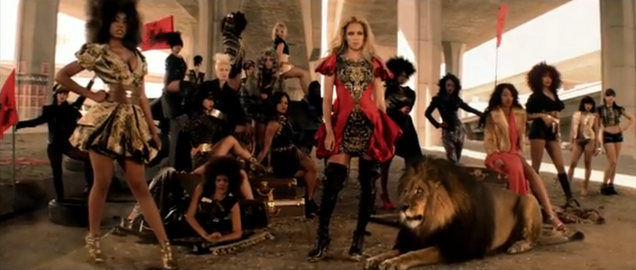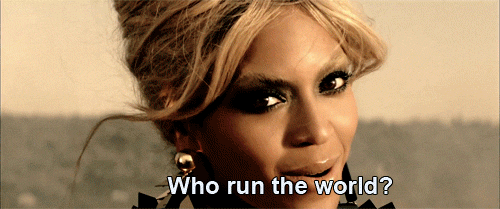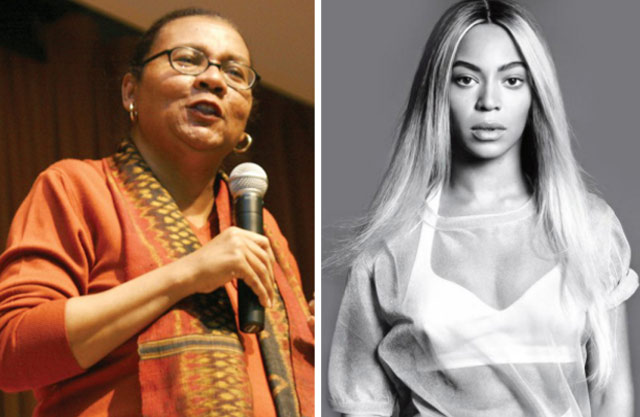Thanks to Girls for Gender Equity, my fellow Moxies and I had the chance to see Beyoncé in perform live on her On the Run Tour!
Ironically, Beyoncé and her self-proclaimed feminism have actively been on my mind for a solid 6 months. In the April 2013 edition of British Vogue magazine, Beyoncé admitted, “I guess I am a modern-day feminist. I do believe in equality. Why do you have to choose what type of woman you are? Why do you have to label yourself anything? I’m just a woman and I love being a woman”. Subsequently 8 months later, Queen Bey released her fifth album, self-titled Beyoncé, and popularly referred to as the Visual Album due to its complete suite of accompanying music videos.
As tensions arose around the sexual content of her new album, Beyoncé’s self-proclaimed feminism came into question. I would contend that Beyoncé is merely another subject in an image, and although she may gain individual empowerment from her sexual expression, she alone is not able to reconstruct feminism for modern times. Instead, her audience, made up of both fans and critics, has the agency to determine what the album symbolizes and how it reflects the perspectives of women, particularly those traditionally left within the margins of “white” feminism. The BeyHive, feminists, and all of society have developed a viral discussion about Beyoncé which may be shaping the reconfiguration of modern, intersectional feminism. So although her image and recent album invite critical analysis of feminism, Beyonce, solely the subject of her work, is not responsible for the sense of empowerment that women may or may not interpret from her music. Beyoncé does not possess the agency to decide how her sexually-loaded music and images will be understood by you, by me, by society.
Immediately before the concert, I believed that Beyoncé had been co-opted by the interests of the patriarchal-capitalist system. Then and now I wonder how long we will continue to confuse her exploitation of female sexuality with empowerment? I have found particular lines and songs irreconcilable with my own emerging feminist framework. Her song “Run the World (Girls)” is incredibly inaccurate and misleading for women and young girls across the globe because we still live in a world in which women are abused, exploited and disempowered by systems of oppression. Similarly yet perhaps a bit extreme, belle hooks has even gone so far to argue that Beyoncé “is in fact anti-feminist — that is a terrorist, especially in terms of the impact on young girls”.
I think many women’s idea of patriarchy and capitalism involves rich white men. We do not have amental schema for corruption coming from wealthy women of color (and men – just look at her husband’s lyrics, “Eat the cake Anna Mae”/lol domestic violence). Look at “Pretty Hurts” – a line goes “Blonder hair, flat chest, TV says bigger is better, South beach, sugar free, Vogue says thinner is better” – does Beyoncé really think her own blonde weaves and wigs do not contribute to the self-esteem issues she is highlighting. Or when was the last time Beyoncé protested Vogue and other magazines for airbrushing and editing women’s bodies?
Nonetheless, despite her controversial image, Beyonce’s performance felt empowering. In that moment, her sexuality, provocative lyrics and powerful choreography created the illusion of a world in which sexism, racism and the patriarchy do not exist. As I danced along to her performance of “Run the World (Girls)” I could actually imagine a world in which women were on top and winning! Even as she sang “Partition” and fully embraced her sexuality I briefly felt as though I could do the same at Duke and feel both empowered within myself and praised by my fellow students. However, these illusions were always smashed when the performance transitioned to Jay Z. I found many of his lyrics and song themes to be derogatory to women. The juxtaposition of their performances sharply re-centered me back to reality and back to an awareness of all the work that still must happen if we wish to achieve true gender equity.
Ultimately, I think that Beyoncé has carefully crafted her music and image to provide women, particularly black women, an escape from a reality in which both their confidence and sexuality are too often not considered positive. So within this world she has invented, yes, women are empowered and perhaps girls do run the world. However I think it can become rather dangerous for young women when they are not able to recognize the difference between Beyoncé-world and the real-world, the BeyHive and the patriarchy.
With this double takeaway, I am left still wondering what the best way is for me and other women and girls to embrace Beyoncé. Is it possible for the women’s movement to leverage her empowerment capabilities in order to advance equality efforts?



